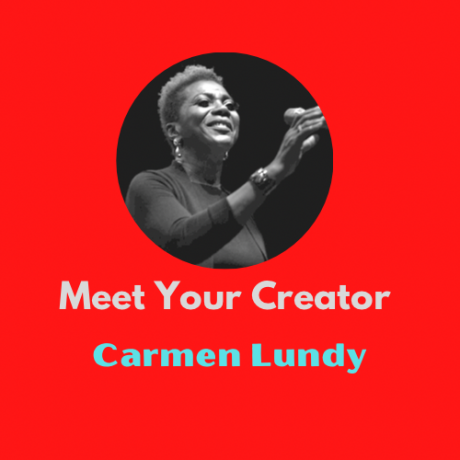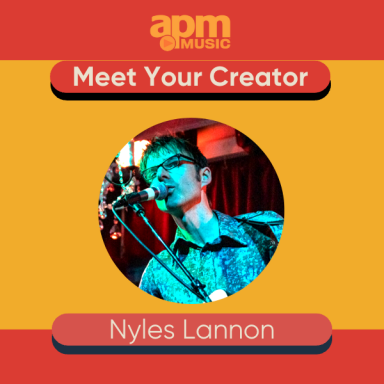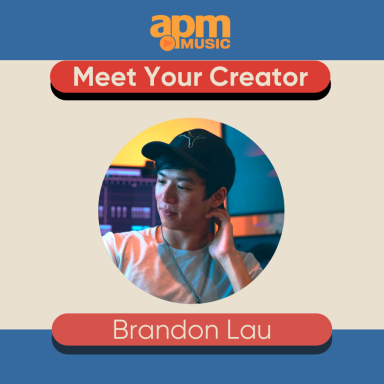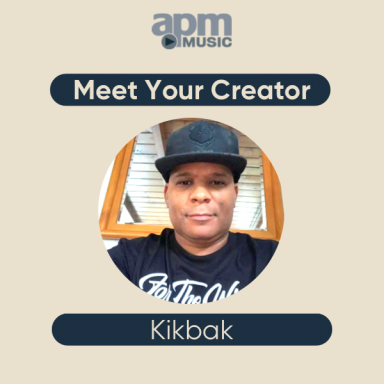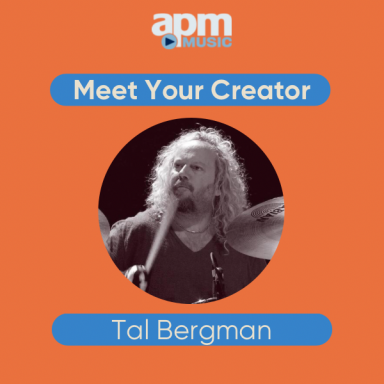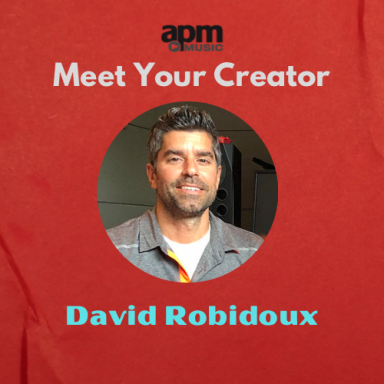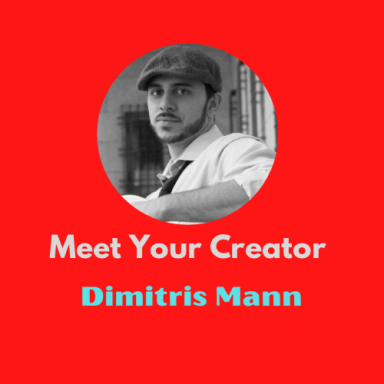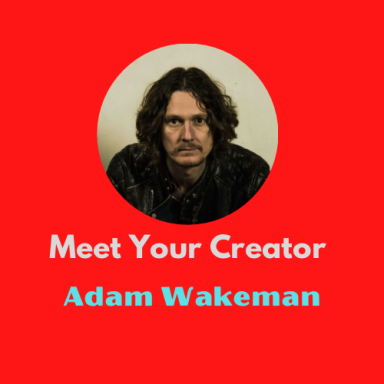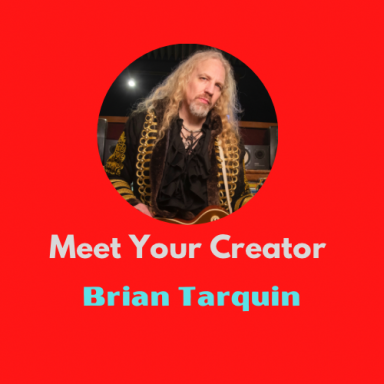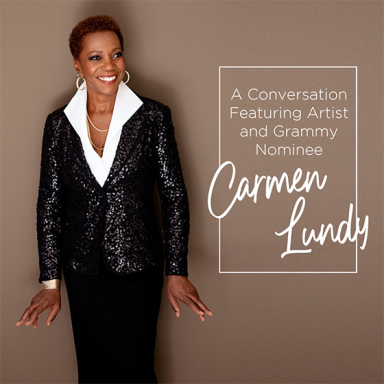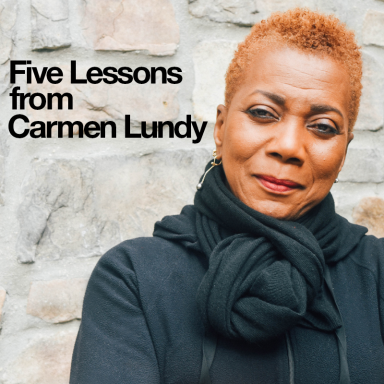Meet Your Creator: Carmen Lundy
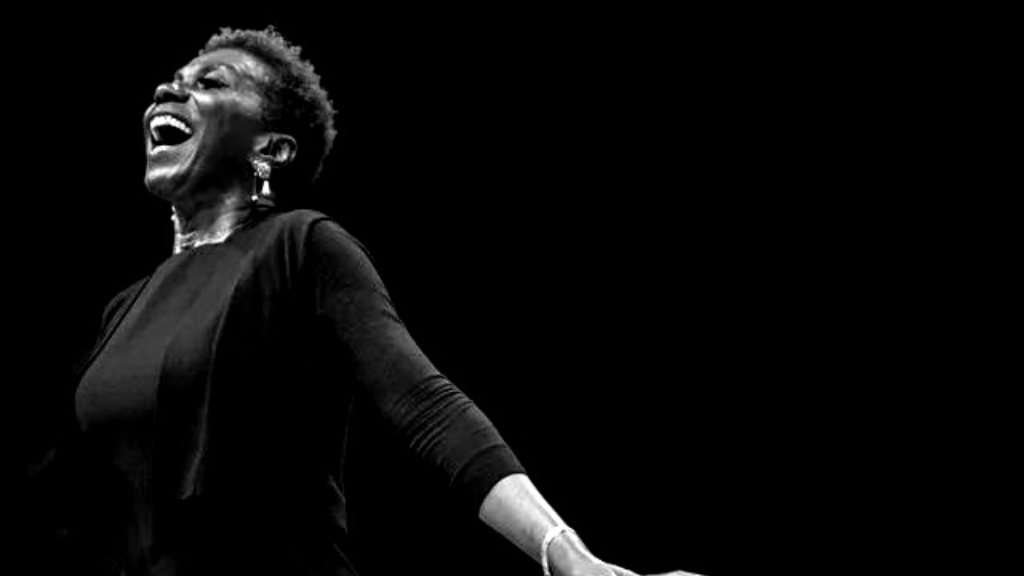
By Sam Freeman
Since launching her career in New York with the Thad Jones/Mel Lewis Jazz Orchestra in the 70s, Carmen Lundy cemented herself as one of today's most longstanding jazz vocalists. With a discography spanning six decades and close to twenty albums, she's not only toured worldwide but can now add back-to-back Grammy nominations to her list of accomplishments.
Given her work with APM dating back to 2001, we decided to chat with Carmen to cover some of her histories and how she got involved in production music.
- Hi Carmen. It's great to be talking to you about your work within jazz and production music. How did your career get its start?
Carmen: "My music journey started with taking piano lessons around 1960, but I didn't know much about jazz growing up. My first exposure to the genre came from seeing the likes of Ella Fitzgerald and Frank Sinatra perform on the Ed Sullivan show, but I didn't realize I'd be pursuing it until I got into the opera program at the University of Miami to study classical voice. They didn't have a curriculum for jazz singers at the time, and I was the first one to be allowed in the jazz department as a major, which served as a reason for them to create the vocalist program after I graduated."
- You've often spoken about the work of your mother, who was a gospel singer with her own group, The Apostolic Singers. Did they have any releases?
Carmen: "No, they didn't. I started my career in the 70s, and during that time, I took for granted my mother's gospel group, where she'd been singing for 40 years. My grandfather was their agent, and he'd book them on the church circuit to open for the likes of Aretha Franklin, The Caravans, and James Cleveland, but they never recorded anything of their own. I began asking questions about that when my seven-year career in Miami ended, and I was about to move to New York. I asked my mom if I could get a cassette of her music, but she said they didn't have any. About 20 years later, my aunt finally decided to initiate some studio recording with the group, and I made a documentary about that experience. It's called Nothing But The Blood', which was one of the songs they always sang, but it's also a reference to the group members being relatives. Nothing But The Blood was shown at The Downtown LA Film Festival and won the Best Music Documentary Award."
- Your brother, Curtis Lundy, is also a successful musician. Have the two of you worked together at all?
Carmen: "Yes, of course. Curtis played electric bass until enrolling at the University of Miami, at which point he switched to upright bass. Whereas I didn't get my first paying gig until 16, he was already gigging at fourteen. In 1975, we started a group called Nimbus, which consisted of Steve Williams on drums, Pat Matheney on guitars, and Jaco Pastorius on bass. It was a great group, but we eventually outgrew that sound and moved on to jazz and other genres, though Curtis and I would still collaborate on music later on."
Curtis & Carmen Lundy - Where'd It Go
- Your very first recording was done at Criteria Studios in Miami and was called "Price of Silence ."What can you share about that?
Carmen: "Price of Silence" was recorded prior to me becoming a jazz singer. I was in a duo with a vocalist called Stephanie Patterson, where I played piano and sang harmony. We stumbled into an opportunity that led to us recording two tracks at Criteria called "Price Of Silence" and "Boy I'm the Girl for You". The producer gave us one acetate disc as a demo which we passed back and forth between our families for 20 years. It got passed around so much that I don't know where it is now."
- Given your experience working at Criteria, can you talk a bit about that studio and its relevance?
Carmen: "Criteria was a great studio, and beautiful records came out of there. The owner, Mack Emerman, had a great ear for music and quality recordings. Major artists recorded there, like Eric Clapton and Aretha Franklin; she and Stanley Clarke made an album there called "Let Me In Your Life". Even James Brown worked there, and I was hired as a backup singer to do a session with him. I later made a demo tape at Criteria prior to moving to New York, and I happened to date one of their engineers for a while too."
- Once you moved to New York, how did you get signed to Columbia Records?
Carmen: "I met Bruce Lundvall at the Montreal Jazz in 1977 when he was the head of Columbia Records, and he said, "Reach out to me when you get to New York". So I made a five-track demo with my band in Miami and took that to Bruce once I'd moved cities. He kind of brushed it off and said, "That sounds good, but bring me something else". I was in New York for seven years before finally making a record they accepted. I spent thousands of dollars on an eight-track demo that featured musicians like Jon Faddis, Victor Lewis, Harry Whitaker, and my brother Curtis. When I took that album to Columbia, Bruce finally dug it."
- How did things go with Columbia after that?
Carmen: "Not so good. I thought we had an agreement in place, but the label pulled the rug out from under me and walked away at the last minute; I still don't know why. Nonetheless, I released my album, "Good Morning Kiss," on another label but couldn't get a gig in New York to save my life, so I became a backup singer in Duke Ellington's Broadway show. It was called "Sophisticated Ladies", and whilst we were touring in Europe, "Good Morning Kiss" climbed to #3 on the Billboard chart. At #1 was Dexter Gordon's "Round Midnight," at #2 was "The Other Side of Round Midnight," and at #3 was me. As I bounced between #3 and #5 for 23 weeks straight, I thought, 'This is crazy. Why am I on the road with someone else's show when my record is a hit? I need to take my own band on the road'. So that's ultimately what I did."
- Given the challenges you faced in your career, what are the commercial aspirations a jazz artist can realistically have? It seems like labels don't view the genre as having much potential.
Carmen: "After having published nearly 200 compositions, I still find that to be a tough question. Sometimes it's an issue when an artist is too independent or knowledgeable, which happened to me in my sessions with JVC in the 90s. I showed up at the first meeting after they'd hired a producer, and all my charts were written down to show what the different instruments would play. You'd think the producer would be relieved that I'd reduced his workload, but instead, he said, 'I thought that was my job'. So there's going to be resistance if it seems you know too much. At other times, label executives have their own idea of what's going to sell. Bruce Lundvall, the same guy who signed Norah Jones, turned me down three times, which is hard to make sense of. Sometimes audience expectations become the issue. Jazz audiences sometimes want music that reminds them of being young and watching their grandparents dance to a swing tune, but that kind of nostalgia has gotten in the way of creativity for the last 30 years. As a result, major corporations tend to ignore the genre because they feel it has no commercial potential. You also have a new generation of 35 - 40-year-old executives making decisions, and if they don't know anything about the jazz industry, they don't engage with it."
- Has anything changed since you got nominated for a Grammy with "Modern Ancestors"?
Carmen: "Well, I played the Hollywood Bowl for the first time in my career last summer (laughs). Winning a Grammy does help, though it doesn't mean that any major labels suddenly want to re-release my previous albums. So it's good for some things but not for others. My newest album, "Fade To Black," is also nominated for a Grammy for "Best Jazz Vocal Album ."So that's two Grammy nominations in a row!"
- Speaking of labels, you and Elisabeth Oei have your own called Afrasia Productions. How did you come to partner with Elisabeth, and when did Afrasia come about?
Carmen: "APM President Adam Taylor introduced us in 2001 at a Sonoton recording session that he recommended me for. Elisabeth has worked for Sonoton for over 30 years, as well as being a producer for the likes of Warner Brothers, and it's been wonderful working with her. Our first release on Afrasia Productions was a live album and DVD of my retrospective show when I turned 50, where I sang 20 of my old songs from the 80s to the 2000s. In total, we've released about ten albums, and we have our own distribution as well."
- As somebody who already had a solid music career, why did you decide to get involved with production music?
Carmen: "That wasn't my plan, but it was nice to be asked by APM in 2001, especially since they didn't impose any creative restrictions - they only needed a patriotic song that resonated with the events of 9/11. To be honest, no one had ever called me and said, 'You can make whatever you want, Ms Lundy. We just want you to do it.' After working with them, I thought, 'What if I could just do this instead of worrying about securing future live gigs?' I could apply my arranging and composing skills to make music that people want". So the opportunity came at a perfect time. I moved to LA in the early 90s, which was a time when local musicians typically wouldn't get hired for major gigs at places like the Hollywood Bowl or Disney Hall. But I was eventually able to play those venues because my secondary income stream from production music allowed me to hold out until the right offer came along. So I love everything about making this kind of music."
- How much would you say production music has moved the needle for you financially?
Carmen: "Unlike some other composers, I haven't been able to completely walk away from my performance life, but the income from production music has allowed me to do certain things that I otherwise couldn't do. For example, I don't have to deal with A&Rs telling me what to sing or which producer to work with, nor do I have to book gigs to sing for people who'd rather focus on eating their steak than listen to the performance."
- What sorts of media placements has APM been able to secure for your music?
Carmen: "I'm always delighted whenever something I've worked on has been used. One of my Christmas songs got placed on Mad Men, and I also got to see my name on the marquee in a Hyundai commercial, thanks to APM. It shows cars parked in front of the Orpheum Theater with 'Carmen Lundy (Sold Out)' written next to it. That kind of visibility could lead to someone discovering my music on Youtube, which is great."
- You mentioned Sonoton earlier. What's it been like working with a label like that?
Carmen: "I only have positive things to say about Sonoton. It's a production music label run by Heide and Gerhard Narholz, and when you meet them, you'll know why their company is so successful. Sonoton is a great example of how to be successful, take care of your artists, and never double-cross people. I couldn't have asked for a better entry into this business through people like Adam Taylor, Elisabeth Oei, and Heidi and Gerhard."
- It's been great talking to you, Carmen. Thanks for sharing about your history and music. What are your hopes for the future?
Carmen: "I'd like to do another project for Sonoton soon, and I'm also acquiring a new keyboard which will open up new sonic opportunities. I'm also working with Matthew Whitaker, a pianist whose sight is impaired, but he's the spitting image of a young Stevie Wonder. '60 Minutes' did a special on him that ran three or four times, and he's extremely talented. Also, playing more guitar is in my plans, so I look forward to doing that."

